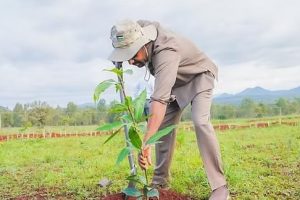
BY STAFF REPORTER
In many ways Ethiopia has been pioneering climate change prevention measures in the continent. One of the latest endeavors in this regard is the massive campaign of afforestation under its Green Legacy Initiative.
Through the program that went on for four years now, the country is able to transplant some 7 billion seedlings in all corners. This is hoped to raise the country’s forest coverage and contribute in mitigating the impacts of climate change in the country as well as the continent.
In the sectors of Energy development Ethiopia has also been pursuing clean energy development so as to boost the global efforts of abating climate change. One of such endeavors is the construction of the Grand Ethiopian Renaissance Dam (GERD) as well as many other hydroelectric power plants.
In addition to the hydropower development, Ethiopia also gives due attention to wind and solar energy technologies to satisfy its growing demand for electric power without affecting the environment.
In a recent roundtable held at UNECA, Ahmed Shide, Minister of Finance of the Federal Democratic Republic of Ethiopia underscored the impacts of climate change in Ethiopia and the local solutions to counter this: “climate change significantly affects the country’s fiscal space and effects the most vulnerable. We are aggressively supporting the solar energy sector through various incentives and committing to 68.8% reduction in carbon emissions by 2030.”
According to a statement from ECA, the roundtable meeting took place ahead of the 2022 United Nations Climate Change Conference (COP27). The Economic Commission for Africa (ECA) and the UN Climate Champions hosted the “African Roundtable on Initiatives to Accelerate Climate Action and Advance the SDGs” and “Coordination Meeting of the African Group of Climate Change Negotiators and National UNFCCC Focal Persons” from 2-4 August, 2022.
The events brought together key stakeholders from both public and private sectors, to showcase both the success stories of private sector investments in climate areas as well as investment-ready climate initiatives in Member States towards ensuring enhanced actualizing enhanced climate action at scale and speed to strengthen African economies and build resilience.
The Roundtable provided a platform to deliberate on catalytic mechanisms to mobilize climate finance investments and crowd in the private sector towards building climate resilience as well as advancing Agenda 2063 and the 2030 Agenda. The event consisted of six roundtable sessions covering issues of energy access, food security, digital transformations, carbon credit markets, the blue economy and water and cities. Each session focused on channels and means to scale up financing around concrete initiatives, investment opportunities, and policy measures in climate action areas.
The African Group of Negotiators (AGN) also gathered to lead negotiators and UNFCCC focal persons from across the continent to deliberate on the key outstanding climate change negotiations issues and discuss the latest information on the road to COP 27.
With the Ukraine war effecting rising food, fuel and fertilizer prices and the fiscal tightening in the US and UK, the United Nations Under-Secretary-General and Executive Secretary of the ECA, Vera Songwe emphasized that, the “conversation…is not only about recovery; it is about resilience. We need to collectively leverage our instruments to create an industry that remains strong against these shocks. In this regard, the ECA launched a Liquidity and Sustainability (LSF) to improve market access for African countries by increasing the liquidity of their debt instruments. The LSF could save African issuers up $11 billion over five years in interest costs. Furthermore, the facility aims to incentivize SDG-linked investment, including increasing green bond issuances.”
Deputy Secretary-General of the United Nations, Amina J. Mohammed spoke to the importance of private sector investment: “the private sector will play a key role in determining whether we succeed or fail, the Economic Commission for Africa estimates that investment in Africa’s green sectors brings a return as high as 420% in value addition and as high 250% in job creation.”
Mahmoud Mohieldin, UN Climate Champion and the UNSG special envoy for financing the 2030 Agenda emphasized the importance of focusing on implementation and on delivering finance directly to projects that deliver climate resilience and improve the lives of populations.
ECA is also supporting Member Countries of the Congo Basin Climate Commission to develop a high integrity carbon market in the region which could significantly contribute toward closing the financing gap for climate resilience and SDG implementation. Arlette Soudan Nonault, Minister of the Environment, Sustainable Development and the Congo Basin of the Republic of Congo stated “this initiative could contribute significantly to the regulation of the global climate whilst mobilizing the revenue Africa needs to adapt to climate change. With a price of at least $50 per tonne, there is a potential to generate approximately $15 billion per annum for African countries.”
ECA has also supported a study which showed the cost of battery precursor production close to the source of battery mineral extraction in the Democratic Republic of Congo would 15-20% cheaper than other destination and would contribute 30% less emission than if manufactured in Asia.
Reiterating earlier calls from Vera Songwe and Egyptian Minister for Foreign Affairs and COP27 President Designate, Sameh Shoukry Ephraim Shitima, the Chair of the African Group of Negotiators, called for COP27 to be focused on implementation, for financial pledges to be delivered on and concrete commitments from developed nations. “The African Group will not only call for the delivery of the $100 billion goal that should’ve been made by 2020, but for an increase of at least $150 billion per year until 2025.”
The African Roundtable showed the importance of continued collaboration between public and private sectors as well as other concerned stakeholders. And in the discussion, calls were made for a just energy transition that prioritizes accessible, affordable and socially responsible climate financing is imperative. Also, a case was made for Africa to leverage the opportunity of a carbon credit market and other innovative financing mechanisms such as debt-for-climate swaps and KPI-linked bonds which can be used to reduce the cost of capital, provide longer and more secure loans and demonstrate more policy stability which in turn attracts new investors.
Consensus was found to push for developing countries to make good on their climate commitments and request transparency and specific timelines on when these commitments will be delivered. The input from the Roundtables will be used to consolidate Africa’s common position for COP27.
The Ethiopian Herald August 9/2022





